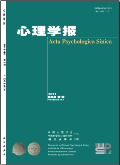心理学报2024,Vol.56Issue(9):1266-1281,16.DOI:10.3724/SP.J.1041.2024.01266
补偿行为对道德违反者群体内疚、群体责任感知和群体羞耻的影响
The effects of compensatory behaviour on group-based guilt,group-based responsibility,and group-based shame in moral transgressors
摘要
Abstract
Guilt and compensation have long been research hotspots in the field of social emotions.Previous studies have mainly focused on how the prosocial attributes of guilt promote moral compensation and benefit victims.They have not thoroughly investigated how the guilt-induced compensation modulates moral transgressors'moral emotion and moral cognition.If guilt-induced compensation is solely aimed at compensating the victims,it would be equivalent for the transgressors whether the compensation to the victims comes from themselves or from a third-party.If compensation behaviour also has an impact on the transgressors themselves,third-party compensation would differ from self-compensation.To examine this issue,the present study investigates how moral compensation affects moral transgressors'moral emotions and moral perceptions through group-based guilt. Experiment 1(n=213)utilises a 2(Group:In-group vs.Out-group)x 3(Compensation Type:None-compensation vs.Third-party compensation vs.Self-compensation)within-subject design,employing a scenario imagination method to induce group-based guilt.Experiment 2(n=105)builds upon the first experiment by using a group-based interpersonal interaction paradigm to induce group-based guilt within a laboratory setting.Additionally,it quantifies the amounts of third-party and self-compensation to eliminate the potential confounding effect of compensation quantity.Experiment 3(n=128)further examined the stability of the results from Experiment 1 and Experiment 2 in non-collegiate population.The experimental designs of Experiments 2 and 3 are the same as those of Experiment 1. These three experiments consistently found that compared to the none-compensation condition,self-compensation significantly reduced group-based guilt and the perception of group-based responsibility,without inducing group-based shame.Third-party compensation also significantly reduced group-based guilt but to a lesser degree than self-compensation.At the same time,third-party compensation failed to reduce the perception of group-based responsibility and even elicited group-based shame.The differential impact of self-compensation and third-party compensation on guilt,responsibility,and shame suggests that guilt-induced compensation behaviour not only benefits the victims but also has positive effects on the transgressors themselves,serving as a form of self-regulation.Through compensation,transgressors can alleviate their feelings of guilt,reduce their sense of responsibility,and diminish the occurrence of shame. Previous research has predominantly regarded guilt as a negative emotion characterised by feelings of guilt and self-blame,emphasising its prosocial attributes towards victims while overlooking the potential benefits that transgressors may derive from guilt-induced prosocial behaviour.The present study suggests that compensatory behaviour triggered by guilt not only benefits the victims but also has a positive impact on the transgressors themselves,serving as a self-regulatory mechanism.Through compensation,transgressors can alleviate their feelings of guilt,reduce their sense of responsibility,and diminish the occurrence of shame.This finding demonstrates the dual effects of guilt,encompassing both concern and compensation towards victims as well as the regulation and restoration of one's own psychological state,thereby expanding our understanding of the prosocial attributes of guilt.关键词
自己补偿/第三方补偿/群体内疚/群体责任感知/群体羞耻Key words
self-compensation/third-party compensation/group-based guilt/group-based responsibility/group-based shame分类
社会科学引用本文复制引用
李志爱,徐梦思,张丽..补偿行为对道德违反者群体内疚、群体责任感知和群体羞耻的影响[J].心理学报,2024,56(9):1266-1281,16.基金项目
国家自然科学基金青年项目(32000737) (32000737)
上海体育大学科研项目自然科学一般项目(2022XJ001) (2022XJ001)
国家自然科学基金青年项目(32100871). (32100871)

